Plastic products polluting Pakistan’s coast, say experts
WWF-Pakistan officials urge people to control plastic use

A beach pictured littered with plastic garbage. PHOTO: REUTERS
The fish was taken on-board a fishing vessel and managed to survive with the cup attached to its midsection. Unfortunately, when the fishermen attempted to remove the cup and rescue the fish, it died.
Studies initiated by WWF-Pakistan reveal that on some beaches, such as the Clifton beach, plastic pollution contributes up to 50% of beach garbage. Even remote beaches along Pakistan’s coast, such as those at Kund Malir and Gwadar, are littered with plastic that is negatively affecting marine life along coastal and offshore waters. It has been reported that globally one out of three marine mammals have been affected by plastic litter. Similarly, studies indicate that about 90% of sea birds digest plastic. Fish and other sea creatures are also not spared, as they often consume micro-plastic or become entangled in plastic debris.
Govt sets out to fix environment
Uncontrolled dumping of plastic products in the terrestrial and marine environment has become a serious threat to animals and plants inhabiting Pakistan’s coastal and offshore waters. According to one estimate, around 6.4 million metric tons of trash, which mostly contains plastic, is dumped in the world’s oceans every year, said an official of WWF-Pakistan. If plastic bags, bottles, toys and packaging material are not disposed of properly, they reach the sea and damage coastal ecosystems.
Plastic waste, which decomposes very slowly, remains floating in the open sea or piles up on beaches. Pakistan is no exception to this, as improper dumping of city garbage at unauthorised locations such as along the shores of Ibrahim Hyderi in Karachi has resulted in an unprecedented increase in plastic pollution on the beaches and sub-tidal environment along the coastline.
“Plastic pollution is becoming a serious threat in Pakistani waters. This is not only being littered on our beaches but is drastically increasing in offshore waters as well,” said Muhammad Moazzam Khan, technical adviser of marine fisheries at WWF-Pakistan. He also said that plastic pollution contributes through flotsam and jetsam generated from ships including fishing vessels operating in the sea.
“Floating plastic is mistaken as food and many animals get trapped in it, with serious and deadly consequences,” he explained. High concentrations of plastic material, particularly plastic bags, are found to restrict the breathing and stomachs of many marine species, including whales, dolphins, seals, seabirds, and turtles.
Rs540m allocated to environment
Khan added that the flat needlefish is a fast moving fish that possibly misidentified the floating plastic cup as a food item and became entangled in it.
Rab Nawaz, senior director of programmes at WWF-Pakistan, urged the local administration to properly remove garbage from the city and called for adequate disposal at dumpsites and controlling of unauthorised dumping of garbage at Ibrahim Hyderi and along other parts of the coast.
He also stressed the need to create awareness among the general public about rational use of plastic in their daily chores and also promote the use of recyclable material instead of plastic. It is a persistent chemical and takes hundreds of years before degrading, he said.
According to Nawaz, the accumulation of plastic in the ecosystem, especially along the coast and in the offshore waters, poses a serious threat to marine biodiversity and resultantly urgent steps are needed to address this growing issue all over the world.



















COMMENTS
Comments are moderated and generally will be posted if they are on-topic and not abusive.
For more information, please see our Comments FAQ